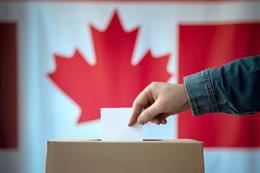New Canadians Could Decide 2025 Election

By Mata Press Service
With the federal election less than 10 days away, a new poll reveals that new Canadians could play a decisive role at the ballot box, as their votes remain wide open and are heavily influenced by pocketbook concerns.
The Institute for Canadian Citizenship (ICC) poll showed that a striking 17% of respondents said they are undecided about how they will vote, more than double the national average.
Even among those who have picked a party, many remain flexible: 29% say they could change their minds before voting day, while one in three have changed their political preference in the past six months.
“This poll gives voice to the concerns of Canada’s newest citizens and shows a high level of democratic engagement among them, with 92% intending to cast a ballot,” said Daniel Bernhard, CEO of the ICC.
“Immigrants are clearly focused on making ends meet and building a stable future. And unlike many Canadians who have become attached to a specific party as a matter of personal identity, new Canadians are much more open to persuasion.”
The top three issues for these voters are cost of living (80%), healthcare (62%), and housing (54%)—echoing concerns heard widely across the country, but with even greater intensity among immigrant communities.
Jobs, taxes, and economic growth also featured prominently in the poll, underscoring the deep connection between economic stability and newcomer priorities.
Many new Canadians face unique challenges when it comes to housing affordability, job access, and navigating Canada’s health system. These interconnected issues highlight the financial pressures and systemic hurdles that shape the concerns of Canada’s newest citizens.
Interestingly, Canada–U.S. relations, often a top-tier issue in mainstream polling, barely made the radar here—just 27% placed it in their top five, ranking it eighth overall.
That divergence highlights a more domestic focus among immigrants, many of whom are still establishing roots in their new home.
This data is a snapshot of a highly engaged and talented voting bloc, Bernhard added.
“Parties that want to connect with this growing demographic of committed Canadians need to speak credibly on affordability, access to healthcare, and housing if they plan to retain this talent in Canada long term.”
The poll also offers a snapshot of current party support among new Canadians:
· 36% of decided voters said they would vote for the Liberal Party under Mark Carney
· 29% backed the Conservative Party under Pierre Poilievre
· 4% supported the NDP
· Other parties registered support below 1%
According to Elections Canada, a "new Canadian elector" refers to an immigrant who became a citizen after the previous federal election and is now eligible to vote for the first time. Based on the 2021 census, about 2.2% of Canadian citizens aged 18 and older are naturalized citizens who immigrated between 2011 and 2021.
Research by Simon Fraser University professor Andy Yan in 2019 found that in the 2015 federal election, the Liberals secured 84% of ridings with majority-immigrant populations. Based on the previous 338-seat riding map, 31 ridings had more foreign-born residents than Canadian-born—and the Liberals won 26 of them.
The Hill Times reported that John Carlaw, an assistant professor at Toronto Metropolitan University whose work focuses on the politics of citizenship, immigration, and multiculturalism, said the immigrant vote is “certainly crucial,” noting the large number of urban ridings with significant immigrant populations.
Statistics Canada data shows that most new Canadians settle in cities. In 2021, 92.2% of immigrants lived in large urban centres with at least 100,000 residents, compared to 67.7% of people born in Canada.
“[That is why] appealing to or at least not turning off significant immigrant populations can really impact your electoral fortunes,” Carlaw said.
He added that because the Liberals introduced “some radical changes” to immigration policy, “that’s probably not a topic that they’re looking to foreground in this election, and they haven’t said that much.”
Carlaw also noted that the Conservatives, who have pledged to cut immigration levels, have a “dual discourse,” aimed at welcoming “good” hard-working people as opposed to “bad” immigrants who’d be “illegitimate” refugee claimants.
With new Canadians making up an ever-larger portion of the electorate, their impact could tip the scales in battleground ridings—especially in urban centres where immigration has reshaped the demographic map, experts concurred.
As parties ramp up their campaigns, the new ICC survey data sends a clear signal: New Canadians are ready to vote, but not yet ready to commit.
Highlights from the 2025 Federal Election Survey Report by ICC
Top Issues for Respondents
The survey, conducted among verified immigrants from the Canoo member database (n=2,397), revealed the following top concerns:
· Affordability and cost of living: 79.2%
· Healthcare: 61.9%
· Housing: 53.7%
· Jobs and employment: 49.3%
· Taxes: 44.9%
Other notable issues included:
· Economic growth: 40.4%
· Crime and public safety: 39.8%
· Canada–U.S. trade relations: 27%
· Environmental concerns: 18.5%, reflecting a shift in priorities compared to previous elections.
Voting Intentions
If the federal election were held today:
· Liberal Party of Canada (Mark Carney): 35.9%
· Conservative Party of Canada (Pierre Poilievre): 28.6%
· New Democratic Party (Jagmeet Singh): 3.8%
· Smaller parties, such as the Green Party and People’s Party of Canada, garnered less than 2% combined.
· A significant portion remained undecided (16.8%) or preferred not to say (12.6%).
Likelihood of Changing Voting Intentions
Among respondents who identified a preferred party:
· Very unlikely to change: 44.3%
· Unlikely to change: 26.7%
· Only 13.8% said they were likely or very likely to change their vote before election day.






